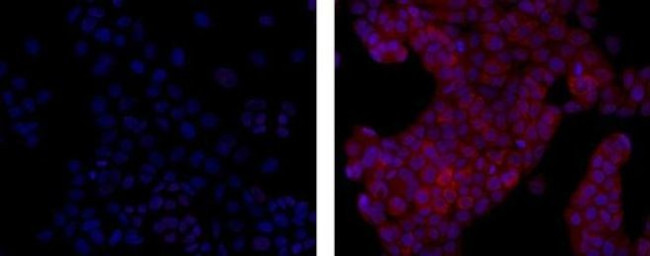Search Thermo Fisher Scientific
Product Details
14-6701-82
Species Reactivity
Host/Isotype
Class
Type
Clone
Conjugate
Form
Concentration
Purification
Storage buffer
Contains
Storage conditions
Shipping conditions
RRID
Product Specific Information
Description: This Ab22 monoclonal antibody reacts with the human myeloid cell leukemia-1 (Mcl-1) protein. This 40 kDa Bcl-2 family member is expressed in B and T cells, macrophages, neutrophils, and hematopoietic stem cells. Mcl-1 is also expressed in non-immune cells such as fibroblasts, epithelial cells, neuroendocrine cells, chondrocytes, and hepatocytes. Reportedly induced by growth factors and cytokines in normal cells, Mcl-1 expression of Mcl-1 can be dysregulated in various leukemias and cancer. Mcl-1 mediates cell survival and proliferation by sequestering the pro-apoptotic Bcl-2 proteins Bak, Bax, and Bim. This protein is also involved in germinal center and memory B cell formation, as well as in myeloid and early lymphoid differentiation. Finally, Mcl-1 activity and dimerization with Bcl-2 family members is dependent on serine and threonine phosphorylation.
Applications Reported: This Ab22 antibody has been reported for use in immunoblotting (WB) and immunocytochemistry (ICC).
Applications Tested: This Ab22 antibody has been tested by immunocytochemistry on fixed and permeabilized MCF7 cells at less than or equal to 5 µg/mL. This Ab22 has also been tested by western blot of reduced Jurkat cell lysate and can be used at 5 µg/mL. It is recommended that the antibody be carefully titrated for optimal performance in the assay of interest.
Purity: Greater than 90%, as determined by SDS-PAGE.
Aggregation: Less than 10%, as determined by HPLC.
Filtration: 0.2 µm post-manufacturing filtered.
Target Information
MCL1 (Myeloid cell leukemia-1) belongs to the Bcl-2 family and is involved in programing, differentiation and concomitant maintenance of cell viability, but not of proliferation. Isoform 1 of MCL1 inhibits apoptosis while isoform 2 promotes it. The carboxy terminal of MCL1 and bcl-2 share significant sequence homology. Expression of MCL1 is increased upon exposure of ML-1 cells to various types of DNA damaging agents (e.g. ionizing radiation, ultraviolet radiation, and alkylating drugs) along with increases in GADD45 and Bax and a decrease in bcl-2. Enhanced expression of MCL1, prominently associated with mitochondria, complements the continued expression of bcl-2 in ML-1 cells undergoing differentiation. Like bcl-2, MCL1 has the capacity to promote cell viability under conditions that otherwise cause apoptosis. While the mechanism by which MCL1 inhibits apoptosis is not known, it is thought that it may heterodimerize and neutralize pro-apoptotic members of the Bcl-2 family such as Bim or Bak. MCL1 was originally identified in differentiating myeloid cells, but has since been shown to be expressed in multiple cell types. MCL1 is essential for embryogenesis and for the development and maintenance of B and T lymphocytes in animals. MCL1 exists as at least two distinct isoforms designated MCL1L and MCL1S. In marked contrast to the larger isoform of MCL1, overexpression of MCL1S promotes cell death.
For Research Use Only. Not for use in diagnostic procedures. Not for resale without express authorization.
References (0)
Bioinformatics
Protein Aliases: Bcl-2-like protein 3; Bcl-2-related protein EAT/mcl1; Bcl2-L-3; Induced myeloid leukemia cell differentiation protein Mcl-1; MCL-1S; mcl1/EAT; MGC104264; MGC1839; myeloid cell leukemia 1; myeloid cell leukemia ES; myeloid cell leukemia sequence 1 (BCL2-related)
Gene Aliases: bcl2-L-3; BCL2L3; EAT; Mcl-1; MCL1; MCL1-ES; mcl1/EAT; MCL1L; MCL1S; TM
UniProt ID: (Human) D3DV04
Entrez Gene ID: (Human) 4170

Performance Guarantee
If an Invitrogen™ antibody doesn't perform as described on our website or datasheet,we'll replace the product at no cost to you, or provide you with a credit for a future purchase.*
Learn more
We're here to help
Get expert recommendations for common problems or connect directly with an on staff expert for technical assistance related to applications, equipment and general product use.
Contact tech support

